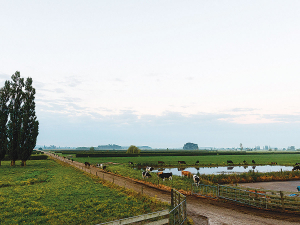Dairy sector profit still on the table, but margin gap tightens
DairyNZ’s latest Econ Tracker update shows most farms will still finish the season in a positive position, although the gap has narrowed compared with early season expectations.
 DairyNZ has confirmed that a 15% stock reduction was not a recommendation of the Climate Change Commission.
DairyNZ has confirmed that a 15% stock reduction was not a recommendation of the Climate Change Commission.
OPINION: The recent Climate Change Commission discussion document has made many farmers anxious.
Quite rightly, they are keen to know what’s in store for them and DairyNZ has been fielding calls from farmers.
The Climate Change Commission was formed alongside work to set the country’s climate targets (including biogenic methane targets). The establishment of the commission is legislated under the Zero Carbon Act 2019 and its main purpose is to provide evidence-based advice on climate issues.
Under the Act, the commission is required to deliver advice on setting emissions budgets across the entire economy to government. This advice has implications for all sectors of the economy, including farming.
The draft advice released by the commission also sent rumour mills into overdrive. One ‘recommendation’ bandied about is that the advice calls for a 15% reduction in cow numbers.
DairyNZ confirms that this isn’t a recommendation made by the commission – although they did model this as a possibility in the future.
What the commission has actually recommended is the Government introduce policies that will reduce barriers to conversion to lower emission land uses. If stock numbers were to reduce, this would not be a blanket rule across all farms and would be more likely to be driven by some farmers choosing to convert to other land uses like horticulture.
Land use change, for example, from dairy to horticulture on flatter and more productive land, could reduce biogenic emissions per hectare. However, it could also cause water quality to deteriorate due to the increased use of fertiliser, and consequential nitrogen and phosphorus losses.
Nutrient losses would vary depending on the crop, the site, weather conditions, the soils’ physical and chemical properties, and how the land is managed. Increasing the area of horticulture could also increase water demand. The commission says that in light of the physical impacts of climate change, this increased need for water would need to be weighed up when considering converting to horticulture as a climate action.
The report also talks about pushing harder to get solutions from science and technology something farmers have been pushing for too.
The commission has opened public consultation on this draft advice for six weeks, from 1st February to 14th March 2021. It will then consider any submissions on the draft advice and finalise advice to the Government by 30 June, 2021.
The commission says every New Zealander will need to play his or her role to help the country combat climate change.
Farmers are ready to play their part.
The National Wild Goat Hunting Competition has removed 33,418 wild goats over the past three years.
New Zealand needs a new healthcare model to address rising rates of obesity in rural communities, with the current system leaving many patients unable to access effective treatment or long-term support, warn GPs.
Southland farmers are being urged to put safety first, following a spike in tip offs about risky handling of wind-damaged trees
Third-generation Ashburton dairy farmers TJ and Mark Stewart are no strangers to adapting and evolving.
When American retail giant Cosco came to audit Open Country Dairy’s new butter plant at the Waharoa site and give the green light to supply their American stores, they allowed themselves a week for the exercise.
Fonterra chair Peter McBride says the divestment of Mainland Group is their last significant asset sale and signals the end of structural changes.